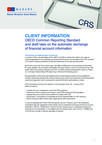
OECD Common Reporting Standard and draft laws on the automatic exchange of nancial account information
Introduction and legal situation in Germany
In autumn of 2014, representatives of the OECD and G20 countries met in Berlin and came to a mutual agreement on the automatic exchange of financial account information from 2017 onwards. The Common Reporting Standard (CRS) was determined as the standard framework.
At this time, more than 90 countries have committed to taking part in this exchange of information. For early adopters, the exchange of information will begin already in 2017 and will apply to tax information from the preceding calendar year 2016. Countries that are adopting later, known as “followers”, will begin implementing CRS beginning in 2018 and the following years.
By participating in CRS, fi nancial institutions (FIs) in participating countries will be obligated to maintain a fi xed data set about the owners of fi nancial accounts and to report this to the responsible government agencies, which exchange this data with the other participating countries.
CRS will impact every fi nancial institution in the European Union. By 1 January 2016, these will need to:
- consider their own classifi cation under the CRS regulations;
- review their client on-boarding procedures in light of the enhanced CRS regulations;
- upgrade their account terms and conditions to comply with CRS;
- expand their IT processes to include features for the implementation of CSR reporting;
- deliver training for staff in these areas regarding the CRS requirements;
In order to implement the OECD CRS into German law, the “Draft of a law on the Multilateral Competent Authority Agreement of 29 October 2014 on Automatic Exchange of Financial Account Information” (BT-Drs. 18/5919 from 7.9.2015) and the “Draft of a law on Automatic Exchange of Financial Account Information in Tax Matters and to Change Further Laws” (BT-Drs. 18/5920 from 7.9.2015) are currently in German legislative procedure.
CRS goes well beyond FATCA
CRS will have a far greater impact than the US Foreign Account Tax Compliance Act (FATCA) due to the high number of participating countries. Whilst CRS was developed on the basis of FATCA , with the result that both regulations are structurally very similar, CRS does differ from FATCA signifi cantly in individual provisions. These include:
- no de-minimis value for pre-existing accounts of natural persons;
- there is no exemption for “local fi nancial institutions”;
- the scope of the “accounts” comprises additional types of accounts and
- certain differences in classifi cation, due diligence and reporting requirements.
For many fi nancial institutions, FATCA was primarily a due diligence exercise as there were often very few reportable accounts. However, CRS will be a far-reaching reporting exercise requiring corresponding organisational and technical systems to be developed.
How Roever Broenner Susat Mazars can help
Our extensive practical experience makes us ideal partners to help you to be ready for the commencement of CRS and meet your statutory obligations.
We are glad to assist with
- reviewing CRS classifi cations in light of the differences that exist from FATCA;
- conducting ‘gap analysis’ reviews of IT upgrades required in order to be prepared for on-boarding new customers from 1 January 2016;
- reviewing existing client on-boarding documentation to ensure that it is CRS compliant;
- updating existing FATCA procedures to ensure they are compliant for CRS purposes;
- designing and delivering training for front-line staff to ensure they are aware of the new requirements;
- supporting and enabling preparation for reporting under CRS.


